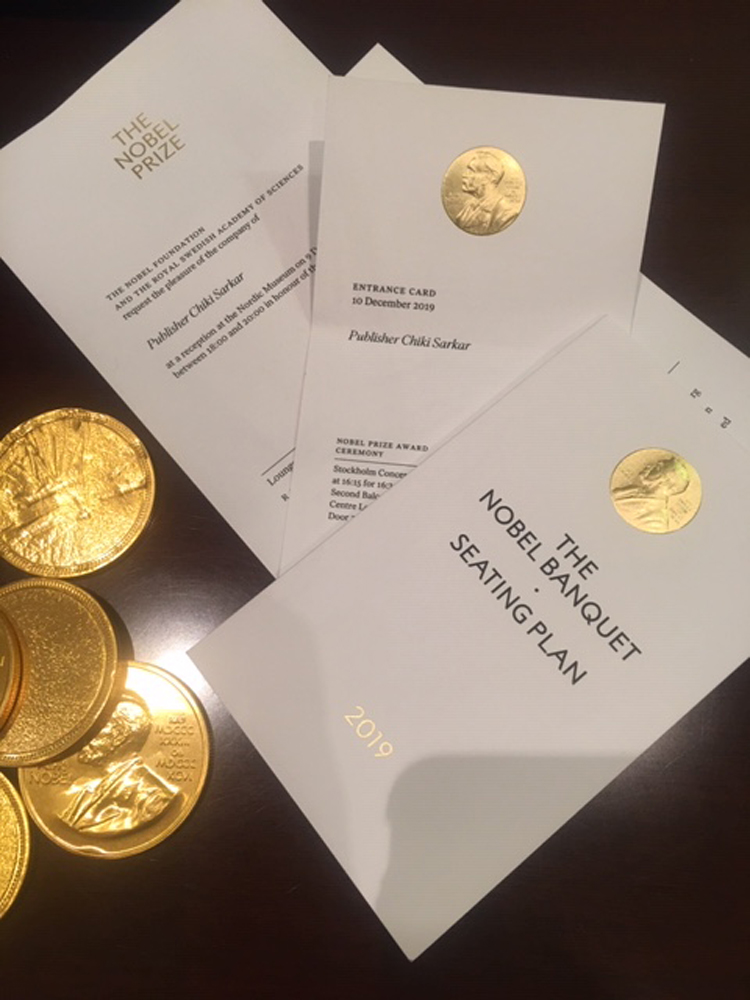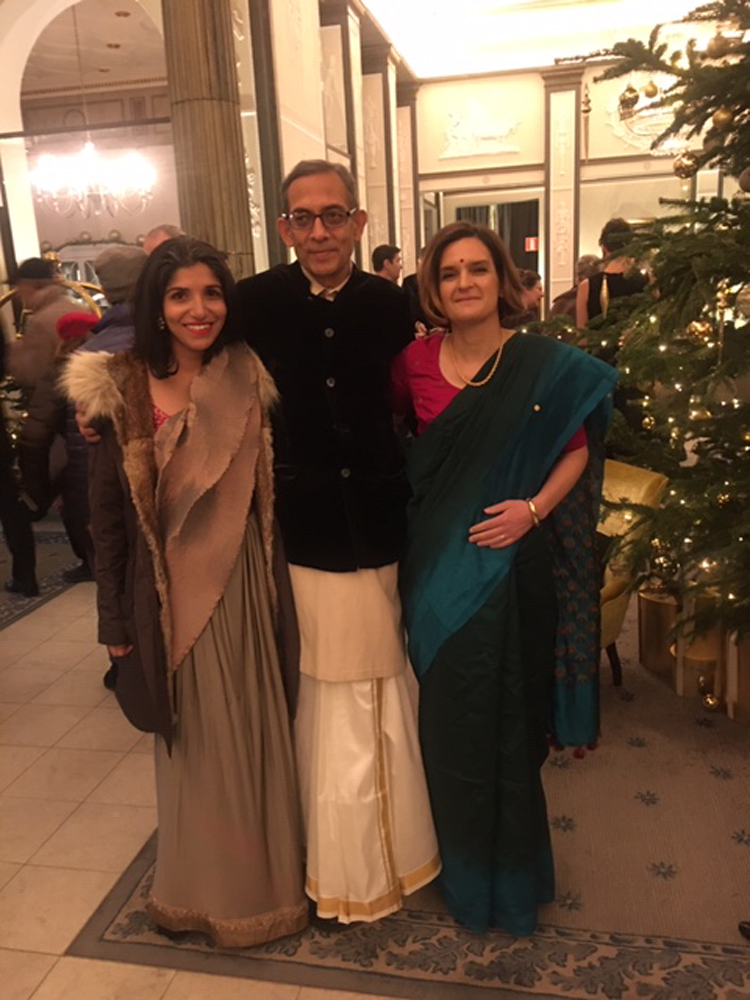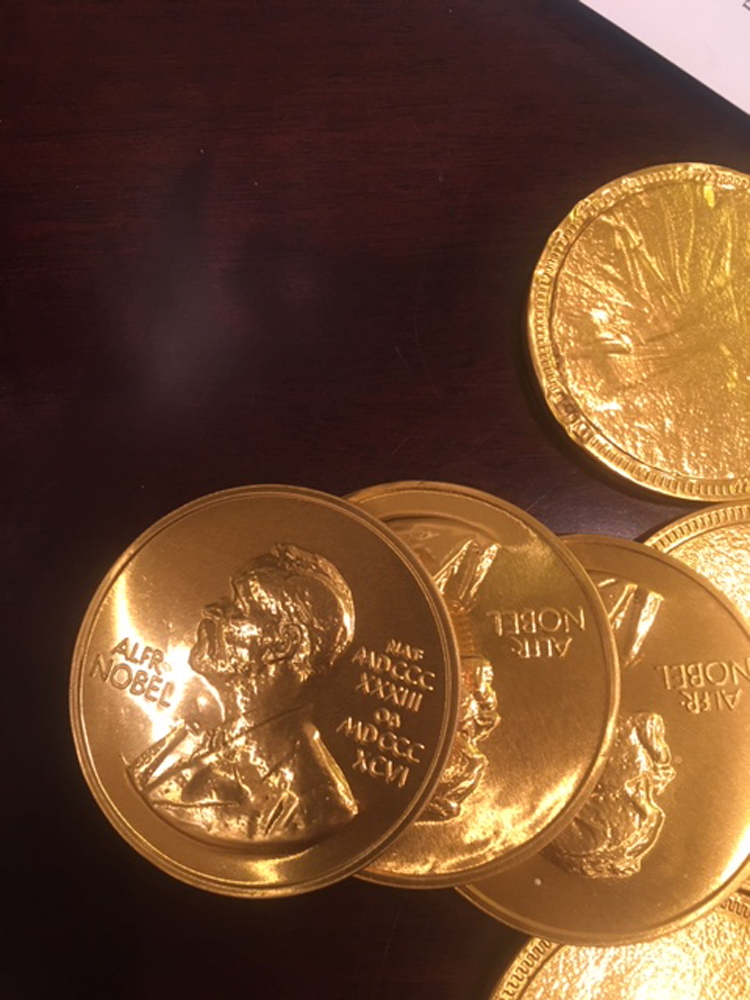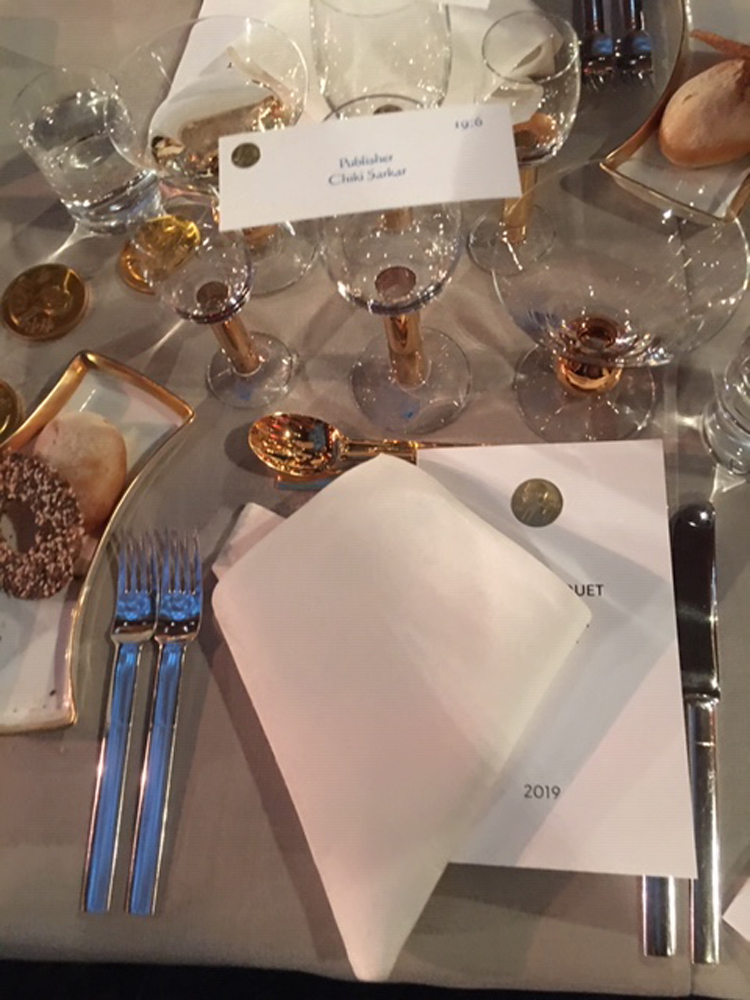Stockholm feels empty — the airport is out of an interiors magazine and as unpeopled as a photo shoot. The airport train isn’t heaving with passengers and suitcases. Where is everyone I say to my husband, my Indian eyes unused to this chic desert.
But in Stockholm’s poshest Grand Hotel, it’s a different story. For the next week it is the epicentre of the country’s most exciting cultural event. It’s the Nobel week - days of lectures, receptions and press frenzy culminating in the Nobel Prize ceremony and a banquet billed as Sweden’s most glamorous dinner party.
We are here as guests of India’s Nobel Prize winner Abhijit Banerjee and Esther Duflo, as their publisher. All the prize winners and guests are staying at the elegant hotel (and the ones who aren’t moan loudly in regret) — and the small lobby, the bar with its wood panelled walls and the glass encased restaurant hum with people and voices and excitement. But let’s begin at the beginning.

The invite Courtesy: The author
December 7: We arrive in the evening, just in time to catch Abhijit and Esther and their kids being whisked off to a function. The week is organised down to the T. The Nobel desk in the hotel hands us envelopes which come with invitation cards for the upcoming days, beautifully printed booklets with the week’s programme, and most fun of all a special plastic card ‘key’ that allows all the Nobel guests to enter all the city’s museums for free.
Now imagine Esther and Abhijit’s schedule. They are taken off to interviews, private receptions at embassies, special recordings for the Nobel committee, panel discussions - there are two cars for them on standby at all times. It’s an exciting exhausting whirr. I get a chance to read their daily schedule and feel a rush of vertigo.
December 8 morning: Most of their guests have arrived. We are a varied bunch. There’s family — Abhijit’s mother, brother and his partner— Esther’s parents and her sister and brother in-law who have gamely brought along their two-month-old girl. Then there are the old friends — two of Abhijit’s JNU mates, an old college buddy of Esther’s who was once Paris’s chief of police (it’s hard to imagine the slight attractive woman handling such a fearsome job) and Emma Rothschild, a distinguished economic historian in her own right. The wife of Abhijit’s mentor and fellow Nobel prize winner Amartya Sen, Rothschild is the least dazzled of us, and the most at ease. This is not just her third Nobel ceremony but she also speaks perfect Swedish.
Then there are the colleagues — people from J-Pal, the organisation the two run and which has spearheaded the RCTs (randomized controlled trials) which they have been awarded the prize for. The president of J-Pal is Iqbal Dhaliwal who is accompanied by his charming wife, Gita Gopinath.
Gita was born in Kolkata but is a Malayalee. Before joining as the chief economist of the IMF, she was a professor at Harvard. She turns out to be more beautiful looking than in her photographs. The other interesting guests are the Jameel family —a wealthy Saudi business family who funded J-Pal and in whose name the lab is named. I discover later that one of the handsome young Jameels is dating pop star Rihanna. Hussain Jameel, alas, was by himself in Stockholm.
Also part of the party is the effervescent Rukmini Banerji (no relation to The Banerjee) who runs the educational NGO Pratham. Esther and Abhijit return time and time again in the week to their collaboration with Pratham and its impact. Its findings are included in the Nobel citation and Rukmini by the end of the trip is nearly bursting with joy and pride. Esther and Abhijit see themselves as part of a movement, the prize a prize for everyone who works within it. And so there is a special collective feeling of celebration.

The author with the Nobel laureates Courtesy: The author
December 8 evening: We are all bussed to the stunning Aula Magna auditorium with its dramatic, layered wooden ceiling in the Stockholm University campus where the three winners give speeches. Abhijit is dressed in an orange kurta-pyjama. Esther is wearing a black dress with flamboyant sleeves. She also has a bold, superbly cut orange coloured coat that she wears through the week. It’s a Christmas present from Abhijit and it cuts a dash against the grey skies, and the dark overcoats.
The stars of the afternoon are Esther and Abhijit’s seven and five-year-old kids who behave perfectly. Mimi pays attention for a little bit, her elfin, mobile little face flickers with pride seeing her parents on stage (two days later when she is told she can’t make it to the actual ceremony, she cries and cries and cries). And then as boredom sets, she returns to her Harry Potter and immerses herself in a world of magic and wizards. Milou, younger, twitches about but silently. As a restless twitchy type myself, I am filled with admiration. That evening there is a concert and another dinner for the Nobel duo.
The lectures were a warm-up for the two Big Bang days.
December 9: There’s a grand drinks reception at the Nordic Museum and then a dinner hosted by Abhijit and Esther at a nearby museum for all their guests. The champagne flows at the long, spectral atrium of the Nordic Museum. On one end is a booth giving out posters of each of the Nobel winners. I pick some up and then in a champagne haze drop them somewhere.
Dinner that evening is great fun —lots of chatter and jousting and clinking of glasses. The food is good— thin sheets of kohlrabi stuffed with chestnut purée, a gamey duck and a delicious dessert which looks like yoghurt with fruit purée but is full of strong, unusual flavours. I seem to remember a bitter bite of orange marmalade paired astutely with chocolate. We stagger back to our rooms at midnight and collapse into deep sleep in the immaculate beds of the Grand Hotel with their crisp cotton sheets, and their comfortable mattresses, giving in just the right amount.
December 10 morning: It’s Alfred Nobel’s birthday and the day on which the Nobel Prize is awarded across physics, chemistry, medicine, literature and economics each year. It will be a long day.
We are meant to be at the lobby by 3 pm— to be bussed to the concert hall where the award ceremony will be held. We will then be bussed to the town hall for the banquet which starts about 7pm and lasts till midnight. That’s nine hours of revelry. And for those who have more stamina, there is an after party at the university hosted by the students that lasts till 4 am!
This is one occasion where the men have to worry about their clothes as much as the women. The girls in the Duflo-Banerjee contingent are mostly in saris. Our only worry is how to manage our cumbersome overcoats over our silks and still look good.
For the men who decide not to wear Indian dress, the planning of the clothes is a bigger affair. A few weeks before the trip, my husband was directed to contact Hans Allde who rents white tie and tails for the men. Unless you have your own tails, this is the tailor for the Nobel and through the weeks preceding our trip Alex has had to supply all his measurements to them.
Now he must go pick up his suit which comes in a long white cardboard box that’s taller than me. Alex thinks he has the wrong shoes — apparently, he can only wear black patent leather shoes, he tells me in a panic. Then it turns out that only the Nobel Prize winners have to wear the shiny black shoes (another of the little arcane details that makes this week so much fun). Alex can wear the pair he bought with him after all. Look at all the pictures of Abhijit during the Nobel week and you’ll spot those special shiny shoes he has been instructed to wear!
Luckily Allde has an arrangement with the Grand Hotel and Alex can just leave his suit behind in the hotel room when we check out. It will be picked up later by the tailor. This is how seamlessly planned this whole week is.

Nobel chocolates for the team back home Courtesy: The author
As part of my prep, I have decided to brave the Swedish sauna in the hotel — which some of Esther and Abhijit’s guests had raved about at our daily breakfast pow-wow with the group (the most delicious hotel breakfast I’ve ever had: succulent smoked salmon, tremblingly soft scrambled eggs, Greek yoghurt with lingonberries and hazelnuts).
The Swedish public baths involve sweating it out in a sauna and then jumping into an ice cold pool. Then doing it again and again. The Grand Hotel sauna also had showers with buckets attached in the ceilings, which drop down ice cold water on you when you pull a chain.
I share the sauna with a girl who works in the nearby department store and who has checked in for a treat. Her eyes widen when I tell her why I am here. “Wow,” she says. “We watch the dinner on TV every year. There is the king and queen, and everyone is wearing beautiful dresses.”
I get another sense of how big the day is going to be when I flick through the Swedish channels and see the Nobel mentioned everywhere. As 3pm nears, photographers gather outside the hotel. The lobby is buzzing with women in gowns and jewels, men in tie and tails. I am wearing a metallic origami like sari designed by Kolkata’s very own Kiran Uttam Ghosh, and very bright lipstick that I am hoping will last me through the night.
December 10 evening: “What a beautiful sari,” Abhijit exclaims when he sees me in the lobby. He is wearing a specially designed dhoti, kurta and Nehru coat designed by the international Woolmark prize winner Suket Dhir. Esther is in a blue green sari and a magenta blouse and bindi. Abhijit’s mother Nirmala has organised the outfit.
Soon the lobby is full of our group— exclaiming over one another. Iqbal, Gita Gopinath’s husband, says he feels more dressed up then he did in his wedding. He is fashionably coordinated in his cream and red Shervani with his wife’s classic cream and red sari. We are like giddy young girls going to our first ball.
Abhijit and Esther disappear into their cars. The rest of us get on the bus and then gingerly make our way through the ice in our high heels. It is already dark, the sun sets here by 3pm.
At the concert hall are booklets which have all the speeches printed out, and the music programme. The empty stage is full of chairs —for the Nobel winners, members of the Academy and in the corner, four seats for the Swedish king and queen, the crown princess and her husband.
The room goes quiet. We stand up. The Swedish Academy members arrive and fill their chairs. They are followed by the Nobel winners. The four royals enter, the womens’ diamonds catching the light, sending diamond beams across the room. This is high and solemn theatre— Abhijit and Esther have had to go for a rehearsal along with the other winners.
The ceremony is ordered and stately. It has been enacted in the same way year after year. A member of the Academy comes forward to make a speech about each category winner in Swedish. They finish off in English after which our winners receive their medal from the king and bow three times. Once to him, once to the Academy and once to the audience. I am moved and in tears as are many of Abhijit and Esther’s guests. The family, sitting in the front rows, must be overwhelmed.

The seating plan Courtesy: The author
Then to dinner. A slippery, cautious walk in our heels (some clever guests had bought a change of shoes) up to the stunning courtyard of the town hall, with its brick arches, it’s high ceiling. The room is decorated with flowers from a warmer place — an annual gift from the Mediterranean town of San Remo. There must be seating for about 1,000 people in the great hall. A central long table for the chief guests and winners, the other tables radiating from it.
We are given booklets where the seating is printed. The tables are beautifully laid out in cream and gold. Strewed across the tablecloth are chocolate coins encased in gold foil to look like Nobel Prize medals. I take a couple to give to the Juggernaut team. Next to me sits a Swedish TV anchor who is married to the leader of the Liberal Party. He tells me this is his first Nobel dinner— the invitation is a big deal.
Our chatter is interrupted by trumpets on the stairway. The chief guests walk down to the hall in stately pairs _ the royal family, the Nobel winners and their spouses, the Academy members. Esther is sitting next to the Swedish prince, Abhijit spends his time chatting with literature winner Olga Tocurczuk’s husband.
The king makes a toast to Alfred Nobel and the dinner starts. We get a delicate kohlrabi to start, duck, served with a buttery kale and chanterelle mushroom, and a freeze-dried raspberry mouse with chocolate. There’s champagne, red wine and a dessert wine. A famous Swedish singer sings between courses.
After dessert, one winner from each category makes a speech. Olga Tocurczuk talks about watching the Oscar winning film, The Wife, with Glenn Close before she came for the Nobel. It tells the story of an American novelist who wins the Nobel and the week in Stockholm from his wife’s perspective. Everyone laughs. We have all watched that film for the same reason.

Exquisite crockery Courtesy: The author
Five hours pass. Where did it all go? We get up and walk up those grand staircases to the hall, with walls of gold mosaic. There is a band and a singer singing Stevie Wonder and jazz. There are lots of women in beautiful dresses dancing in the dark honeyed light. I dance with Alex and then am hit by a wave of exhaustion. It’s midnight and I have turned into a pumpkin. I slip back to the hotel, into that perfect bed.
But the revellers remain through the night. Abhijit and Esther, and many of the others including Alex, head to the students’ nightcap and dance to Abba and Lady Gaga till four. Sometime in the early part of the morning, Alex falls into bed, giving me a sleepy kiss and passing out.
December 11: We have hungover breakfast, our faces still full of sleep. Abhijit and Esther come and join us— they have two more days of dinners and activities including a night at the palace. How will they have the energy, I wonder? There will be more champagne and speeches and toasts. More enchanted evenings. The rest of us will pack up and fly back tonight to work and family and real life.
Thank you for coming, says Esther. Alex and I laugh. No, no. Thank you for inviting us, we say.

The concert hall Courtesy: The author










